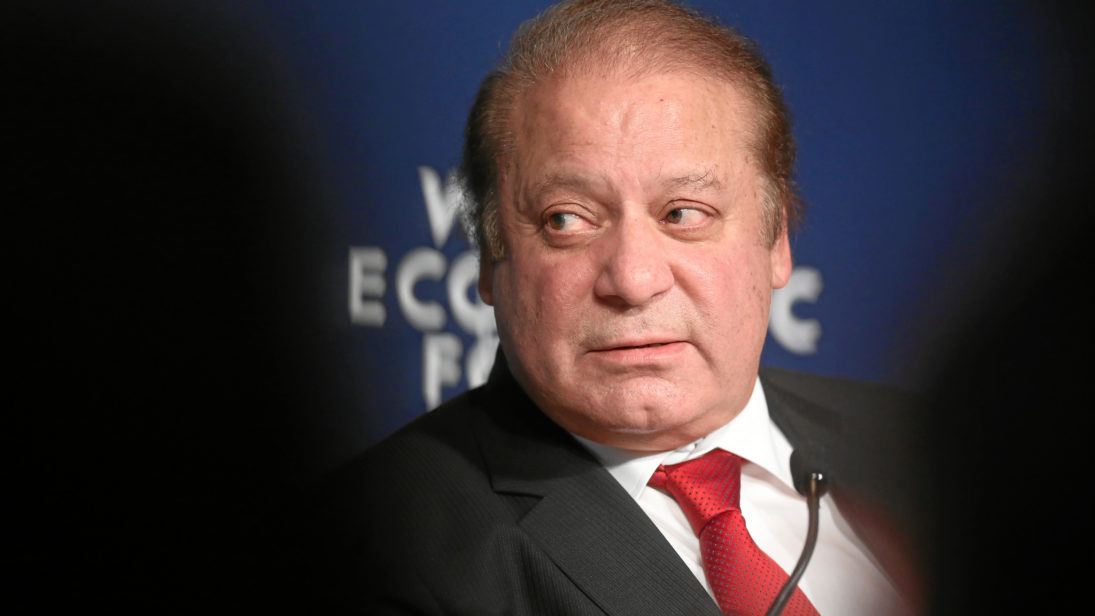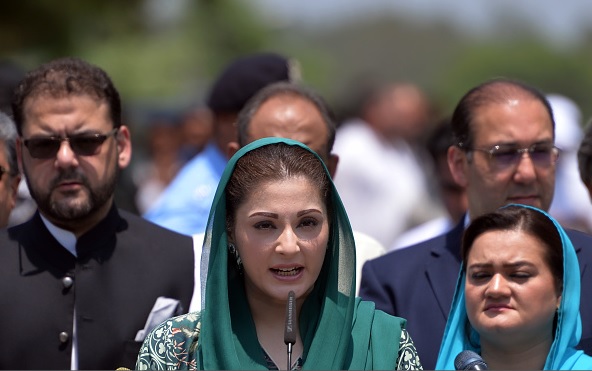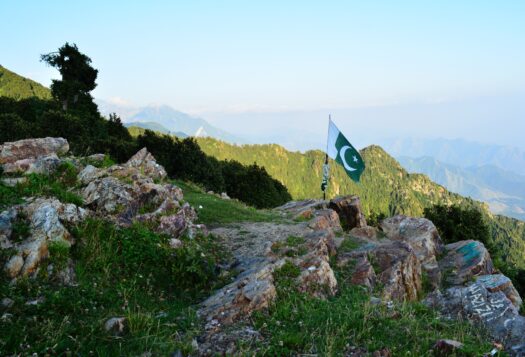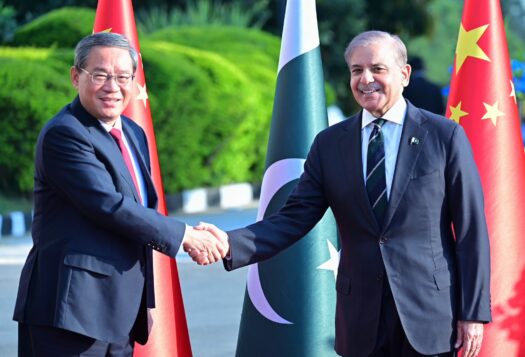
Charged with corruption, ex-Prime Minister Nawaz Sharif, along with his daughter Maryam Nawaz, returned to Pakistan last Friday. Sharif’s return and subsequent incarceration is a significant event; not just in his career, but also in Pakistan’s seventy-year history of civil-military divide. Although Pakistan’s accountability court ruled that Sharif be sent to jail for ten years and his daughter for eight years, they still returned to Pakistan from London, where they were with Sharif’s ill wife. They could easily have avoided jail by staying in self-imposed exile in London, as former Prime Minister Benazir Bhutto did for eight years while she was avoiding her own corruption cases.
Although Sharif may be in jail and the Pakistan Muslim League-Nawaz (PML-N) appears unlikely to triumph in next week’s general elections, the narrative Sharif seeks to project about the importance of prioritizing Pakistani civilian government control continues to resonate with his followers. This narrative has the potential to radically transform Pakistan’s political landscape.
Sharif’s Future
Sharif has blamed hidden forces – by which he is referring to the military establishment – for the accountability cases against him and his family. As a three-term prime minister, his journey has been marred with allegations of collusion with the same military establishment that has today allegedly paved the way for his ouster. In the 1980s, during the dictatorial regime of General Zia ul Haq, he was Pakistan’s finance minister as well as the Chief Minister of Punjab. Today, he fights that very military establishment mindset, which staunchly believes in maintaining a stronghold on the political and governance landscape of the country
Sharif’s political future lies in how his narrative regarding the importance of the civilian sector over the military stands the test of time. At 68, with his daughter ready to inherit his political legacy upon her release from jail and himself disqualified from holding public office, Sharif is not eyeing the seat of power. His bold decision of serving jail time instead of accepting a plea deal has made his supporters label him a messiah for democracy. Until now, he has rejected all offers of a deal that would have allowed him and his daughter to stay in exile in London. In return, his cases would have been put on the backburner.
The political repercussions of any deal with the military may prove dire for Sharif, whose legacy would be undermined as his supporters might perceive that he has betrayed his cause of civilian supremacy.
Will Sharif give into the rigorous punishment awarded by the court or strike a deal with the military establishment? For now, it is unlikely that he will strike a deal, as he believes the military has exhausted all its options. Additionally, the political repercussions of any deal with the military may prove dire for Sharif, whose legacy would be undermined as his supporters might perceive that he has betrayed his cause of civilian supremacy. It would also negatively affect his daughter’s political future, as she has put all her political capital into this campaign. If Sharif stands his ground and does not give into the military, he may continue to ensure an enduring legacy of fighting for civilian control over the country.

PML-N’s Future
Sharif’s narrative of victimhood must be seen in the context of his accusations that powers-that-be have squeezed the PML-N with the intention of shaping the election’s outcome. With Sharif himself condemned to jail for ten years, corruption inquiries against his brother and the current PML-N president, Shehbaz Sharif, as well as the announcement of an inquiry against the former Prime Minister, the disqualification of former Privatization Minister Daniyal Aziz, inquiries against former Railway Minister Saad Rafique, and contempt of court proceedings against former State Minister for Interior Talal Chaudhry, the PML-N has clearly been put in a tight spot by the judiciary. These swirling corruption allegations have placed the PML-N’s back against the wall, making it difficult for the party to remain a force to reckon with in the upcoming general elections.
Despite the PML-N’s travails, the party can find hope in Maryam Nawaz’s political future. In her decision to join Sharif on his return to Pakistan to face jail time, her political standing has been elevated to a new level. Her supporters and voters describe her as “lion-hearted,” in a reference to the PML-N’s symbol of the lion. She has built up a narrative of victimhood: a victim whose husband and father are both incarcerated, as a daughter of a mother who is on ventilator support, and as a mother whose son was arrested the same day as she was traveling to Pakistan. Her influence having risen, she will be widely welcomed into the political fold by her supporters whenever she is released from jail. With Sharif barred from running in elections again, she is undoubtedly one of the natural leaders of the PML-N in the future. Many consider her the political heir to Sharif, a fact that alone indicates she could be prime minister in the years to come.
Pakistan’s Future
While PTI may be able to form the government next week, Sharif has been successful in cementing his legacy and pushing forward a narrative on the dangers of military interference in the electoral process.
The PML-N’s chief rival Pakistan Tehreek-e-Insaf (PTI) is in ascendancy. Many of its stalwarts from southern Punjab, the party’s fortress, have left the PML-N for the PTI. While the latest polls still put the PML-N on top, they also reveal that the PTI has cut the margin considerably and is catching up fast. The PML-N, on the other hand, is down but not out, especially after Sharif’s courageous return. His return has injected new life into the PML-N: though the party’s voter base is not known for its street power, Sharif’s return mobilized his supporters as they came out in larger numbers to welcome him. However, the damage to the party’s electoral campaign has already been done by the powers-that-be. It remains to be seen if the PML-N will be able to translate Sharif’s narrative of victimhood for electoral gain.
While the PTI may be able to form the government next week, Sharif has been successful in cementing his legacy and pushing forward a narrative on the dangers of military interference in the electoral process. Though this success may not translate into electoral triumph, he has been able to stimulate further debate among the masses on the military’s transgression into the civilian government’s domain. It is likely that much of the debate in the coming months will be around the civil-military relationship in Pakistan and who has the right to govern.
Interestingly, this narrative is not something only Sharif has been furthering. Only a few years ago, PTI chief Imran Khan also actively campaigned for army accountability. He may have put his criticism of the military aside for electoral convenience for the time being, but the negative perception in the public about the military’s political role is alive. This was emphasized recently in a survey by PILDAT, which assessed the perception of neutrality of military towards contesting political parties as “highly unfair.” The issue of civilian supremacy is an issue taking root within the public, and it may become the most contested issue in the political history of Pakistan.
***
Image 1: Jolanda Flubacher/World Economic Forum via Flickr
Image 2: Aamir Qureshi/AFP via Getty Images


